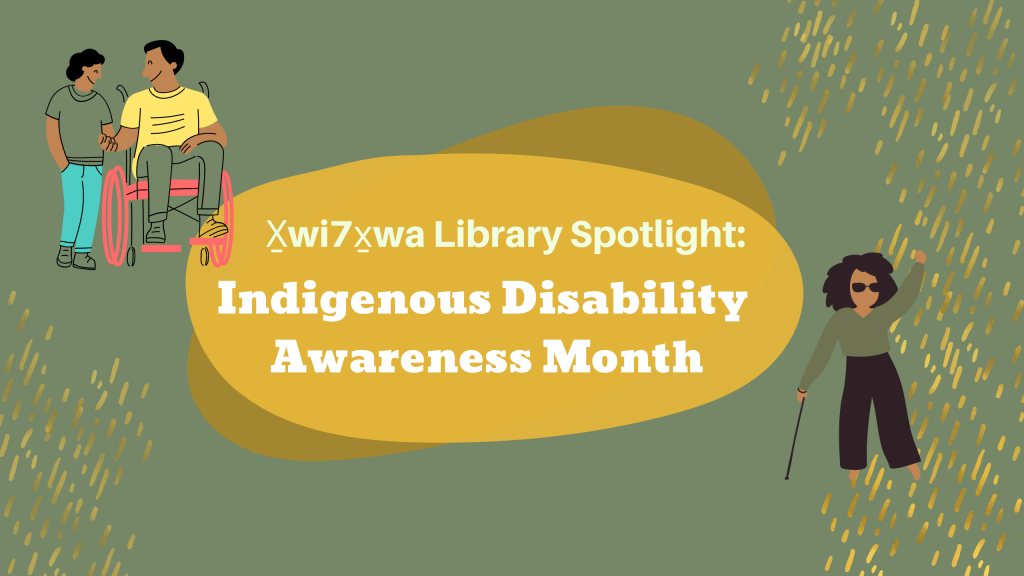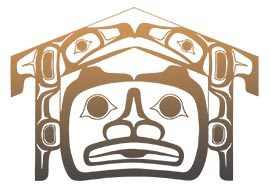
November 2020 is the 6th anniversary of Indigenous Disability Awareness Month in B.C. and across Canada. The B.C. Aboriginal Network on Disability Society notes that “Indigenous people in Canada experience a disability rate significantly higher than that of the general population. Indigenous Disability Awareness Month (IDAM) brings awareness of these barriers and issues that Indigenous peoples and their families living with disabilities face every day. More importantly, we celebrate their achievements and recognize the significant and valuable contributions they make to our communities socially, economically, and culturally.”
In relation to Indigenous Disability Awareness Month X̱wi7x̱wa Library hoped to produce a booklist of #ownvoices fiction, non-fiction and scholarly sources related to Indigenous experiences of disability. After searching UBC’s scholarly resources, Twitter, GoodReads, Google, we found a gap in fiction, non-fiction and scholarly writing on this topic.
We’d love to hear from you: what are your recommendations for #ownvoices reading or media about Indigenous experiences of disability? Email us at xwi7xwa.library@ubc.ca!
At UBC, the Crane Library is available to support students with disabilities through the Centre for Accessibility.
Researching Disability and Indigeneity
The language used to define and discuss disability, or differing abilities, is often context dependent and especially so in Indigenous communities. Beliefs about wellness and unwellness are different from community to community and often expanded to include the impact of colonization. Research about disability and Indigenous people is limited but is located primarily at the intersection of Disability Studies and Indigenous Studies, although it could encompass other areas of study (e.g.: education, social work, occupational therapy). Please bear in mind that some of the terminology used to do research about disability and Indigeneity may be outdated.
Start your research using the UBC catalogue or Summon. Please visit X̱wi7x̱wa Library’s First Nations and Indigenous Studies research guide for more information about doing research. Please email xwi7xwa.library@ubc.ca for additional research support.
Useful keywords for searching UBC Summon and databases might include:
Combine keywords related to Indigenous identity with keywords about your topic. For example: Indigenous AND disability
- Indigenous
- Aboriginal
- race
- disability / disabilities
- accessibility
- ableism
- wellness
- Terminology specific to different abilities (deaf, deafened, Sign Language, Indigenous Sign Language, etc.)
- Terminology specific to Indigenous communities (Cree, Métis, Inuit, etc.)
See X̱wi7x̱wa Library’s “First Nations and Indigenous Studies” guide for additional information about searching using keywords and finding Indigenous perspectives.
Some useful subject heading for searching UBC Summon might include:
(Native people with disabilities)
(“Aboriginal Canadians” AND Disabilities)
(“Disabled people” AND “Native American studies”)
Useful journals and other e-resources might include:
Journal of Literary & Cultural Disability Studies
Core Indigenous Studies journals
Indigenous health databases and statistics
Fiction and Non-Fiction
Below, you’ll find some adult and children’s books written by self-identified Indigenous authors with disabilities, Indigenous literature with differently abled characters, and books on the topic of disability. Unless otherwise noted, all books listed are available at a UBC Library for currently registered students, faculty and staff. For community borrowers, please check for these books at your local public library. If your library does not carry a book that you want, you can often request the library purchase it.
Adult Books & Media
Heart Berries: a memoir by Theresa Marie Mailhot: In this memoir, Mailhot chronicles her experience living with chronic mental illness.
“Seed Children” by Mari Kurisato in Love After the End. Love After the End is a new two-spirit, Indigiqueer science fiction/fantasy anthology, currently available as an ebook with the physical book on order at Vancouver Public Library.
Indian Sign Language by William Tomkins: An unabridged and corrected re-publication of the 1931 fifth edition of the work originally published by the author in San Diego, California under the title Universal Indian Sign Language of the Plains Indians of North America.
My Sister by Thirza Cuthand and Danielle Ratslaff (streaming media): Two thoughtful young friends openly discuss their relationship with their sisters, both of whom have intellectual disabilities.
You Don’t Have to Say You Love Me by Sherman Alexie: In this 2017 memoir, the author recounts his childhood hydrocephaly, alcoholism and bipolar disorder.
All the Weight of Our Dreams: On Living Racialized Autism: “Delve into poetry, essays, short fiction, photography, paintings, and drawings in the first-ever anthology entirely by autistic people of color, featuring 61 writers and artists from seven countries. The work here represents the lives, politics, and artistic expressions of Black, Brown, Latinx, Indigenous, Mixed-Race, and other racialized and people of color from many autistic communities, often speaking out sharply on issues of marginality, intersectionality, and liberation.” Available at Vancouver Public Library.
My only daughter : Karina Beth-Ann Wolfe / producer/director, Grace Smith: “Carole Wolfe, a deaf Indigenous woman in Saskatoon, bravely shares the story of her daughter’s disappearance in 2010. Told in American Sign Language.”
Children’s Books
Native Athletes in Action! By Vincent Schilling (for middle grade ages): In Chapter 3, readers meet Cheri Becerra-Madsen (Omaha) a wheelchair racing Olympian and world record holder who lost use of her legs at age 3.
Tribal Journey by Gary Robinson (for middle grade ages): “Sixteen-year-old Jason is left with a paralyzed leg after a car accident and it is only after becoming involved with his Duwamish mother’s tribe and learning to “pull” a canoe that he begins to see himself as more than a boy in a wheelchair.”
Spirit Bear and Children Make History (for elementary grade ages): “Hello! My name is Sus Zul in the Carrier language. In English, people call me Spirit Bear. I am a proud member of the Carrier Sekani Tribal Council. I am on my way to Ottawa, Ontario, to witness a very important human rights case. Would you join me on this journey?” When Spirit Bear’s mom tells him about an important human rights case happening in Ottawa, Ontario, he makes the LONG trip (by train, his favourite way to travel) to go and watch, and to stand up for First Nations kids. And he isn’t the only one! Lots of children come too — to listen, and to show they care. Spirit Bear knows that children can change the world because he’s there to see it happen. This is the story of how kids — kids just like you — made a difference … with a bit of help from some bears and other animals along the way!”
